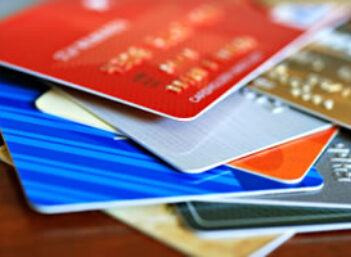Debit cards look and feel like credit cards, but they offer paperless, electronic withdrawals from your checking or savings account. They're more convenient than carrying cash or writing checks.
In short, they're plastic you can spend with without having to worry about racking up debt.
That said, they have plenty of drawbacks you should know about. So if you're contemplating making the switch from a credit card to a debit card, keep an eye out for these pitfalls:
1. Overdraft Fees
Arguably the worst, and most maddening, drawback to a debit card is the propensity of banks to charge obscenely high overdraft fees if you've accidentally taken your account balance below $0.
Unfortunately, many people who use debit cards tend to be lackadaisical when it comes to the necessary follow up (i.e. balancing their checking and savings accounts). And that's exactly what you need to do: carefully note each and every use of your debit card. Unlike the situation with a credit card, you need to write down every penny you've electronically withdrawn via your debit card — discipline that many debit card users lack if they start to use their debit card as a de facto credit card.
The penalties for this sort of inattention are quite steep. Overdraft charges can be $30 or higher, even if the debit withdrawal was only for a few dollars.
As an example, let's assume you've lost track of your balance and you've made a series of small purchases, unaware that you were overdrawing your account. Even five overdrawn purchases of $5 each could incur a total bill from your bank of $150. So keep track of your card spending!
2. Poor Fraud Protection
Debit cards lack the same anti-fraud safeguards as credit cards. If you get ripped off in a fraudulent transaction, federal regulations govern debit cards differently than credit cards. Generally, you're responsible for the first $50 of fraudulent charges on a credit card. But with debit cards, your liability can be as much as $500.
You also have a tighter time window, typically about two days, to report fraud to the bank to be eligible for a waiver with a debit card, whereas with a credit card, you can have up to 60 days.
Moreover, if you detect a problem with a purchase you already made with a debit card, it's already too late to do anything about it. After all, you can't withhold payment in the same way you can with a credit card.
And keep in mind, if someone gets hold of your debit card and password information, they can siphon off your entire account in seconds, with no recourse for you.
[Protect yourself with the 7 Ways to Hack Proof Your Online Bank Account]
3. No Leverage in Disputes
If you need to argue with a merchant over a purchase, you're at a distinct disadvantage with a debit card, because unlike making a purchase with a credit card, the merchant already has your money.
The same principle applies to any dispute with the bank. With a credit card transaction, the bank's money already has been spent, which means the bank has incentive to get its money back from a merchant if there is a dispute. However, when a debit card is used, it's your money that is out the door, and the bank has no real motivation to fight for you.
4. No Float or Grace Period
With a credit card, you enjoy the 'float' or 'grace period' between the time that you make your purchase and the deadline as to when the bill is due. Not so with a debit card from which the money is immediately deducted from your bank account.
5. Few Rewards
Unlike credit cards, debit cards don't typically offer rewards, such as frequent flier miles, cash back, or 'points.' Then again, there's a tradeoff: Credit cards that offer these perks may impose high interest rates if you carry a balance.
[Get up to 6% cash back and other perks from this year's Top 5 Rewards Cards.]
6. No Help to Your Credit History
Sure, a debit card won't rack up interest-incurring debt the way a credit card will, but if you use your debit card in a conscientious way, it doesn't beef up your credit score the way paying off a credit card will.
All that said, debit cards have many advantages. If used properly, they're a convenient way to withdraw money, without handling paper money or writing a check. They also don't build up high-interest debt, month after month, the way a credit card can. If you remain mindful of the common dangers of a debit card, there's no reason why you can't make it work for you.



